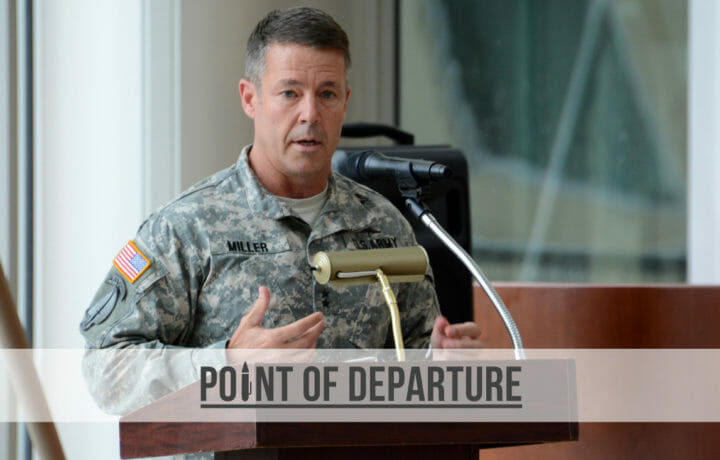After Army General Austin “Scott” Miller stepped down as the commander of U.S. forces in Afghanistan, the Naugahyde on his desk chair had barely cooled when the criticism started rolling in. The Commander of the Afghan Army, General Sami Sadat, said he felt abandoned by the U.S. The New Republic was quick to focus in on the military leadership so prominent over the past 20 years in Afghanistan: “Blame the Generals” accused our country’s military leaders of a lengthy campaign of “lies and deceit” that ultimately ended with our withdrawal. Summoning the ghosts of Vietnam, the article went on to assert that the current generation of wartime commanders had similarly failed to accomplish the mission set forth by the White House and Congress.
If it was only that simple.
Enough Blame to Go Around
Do those generals share a part of the blame? Without a doubt. But in a war that cost the U.S. nearly two trillion dollars and almost 2,500 dead, there is plenty of blame to go around, especially when it comes to Afghanistan. In the wake of the attacks of 9/11, the military expedition into Central Asia enjoyed rapid and noteworthy success. But the goals were limited: unseat the Taliban and root out al Qaeda, the terrorist organization responsible for the attacks. By December 2001, with the Taliban in full retreat and an interim government in place in Kabul, those goals were largely met, even though Osama bin Laden had escaped into Pakistan.
Then two things changed all that. On April 17, 2002, President George W. Bush announced his intent to begin a reconstruction effort in Afghanistan, invoking the Marshall Plan in a speech at the Virginia Military Academy. Then on May 1, 2003, Defense Secretary Donald Rumsfeld declared that “major combat” was over (an announcement that coincided with President Bush’s “mission accomplished” declaration of the end to the fighting in the Iraq war), relegating Afghanistan to an economy of force operation. In the eyes of the policy makers, Kabul was being put on the back burner.
The rest, as they say, is history. The Taliban was down, but not out. Violence in the country escalated, and what became a revolving door of “strategeries” was soon the norm on C-SPAN. Like a clip straight out of the film War Machine, every couple of years a four-star general would march on Capitol Hill with a new strategy for Afghanistan, a fresh plan to meet the elusive goals of reconstruction and the vague and often disconnected policies supposedly designed to further those goals. The strategies themselves weren’t necessarily bad, but the political theater surrounding them was cringeworthy.
Military Strategy
So, why blame the generals? As U.S. Army War College professor Steven Metz wrote in a 2019 World Politics Review article, “America’s strategic problems are not purely or even mostly the military’s fault. If there is a failure of strategy, its roots are deep in the way the United States has approached the conflict.” Metz further notes that the generals, along with the defense industry and security specialists, share some degree of responsibility for misreading Afghanistan and the enormity of their task. “It was never the military’s responsibility,” Metz wrote, “to be the architect of ultimate victory or to alter the conditions that fuel extremism.”
That responsibility rested somewhere on the Capitol Mall between Congress and the White House. In an article for Military Strategy Magazine, “It Is Our Fault,” Kevin Benson reminded readers, “Military strategy is derived from policy guidance.” Yet, even as NATO’s military strategy struggled to stabilize the Afghan countryside and provide the expertise to help a fledgling government find the footing necessary to be one day self-sufficient, the politicians and policymakers shirked any vestige of responsibility, never once asking the generals the most important questions. “How long will this take?” “How much will it cost?” “Is this even possible in our lifetimes?”
Defining Success in Afghanistan
The Marshall Plan was as grand a strategy as grand strategy gets, but we never quite got there with Afghanistan. And to be fair, the generals—conveying the kind of “can do” attitude that marks leaders of their stature—were reluctant to point out the near-impossibility of their mission or the glaring absence of a true grand strategy. Oval Office meetings and Senate hearings were little more than pantomime, as the various actors danced around the elephants in the room and avoided the uncomfortable, difficult questions.
If there were lies and deceit involved, it was in denying the obvious: as defined, success in Afghanistan would require a multi-generational commitment of blood, treasure, and public will. Which, after 20 years of flailing without a modern-day Marshall Plan, were all in limited supply. So, yeah, go ahead and blame the generals. Blame the policymakers. Blame the politicians. There’s plenty of blame to go around.




